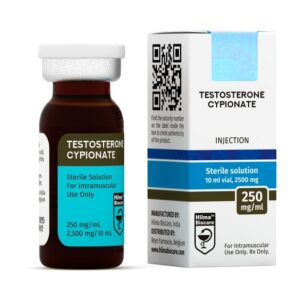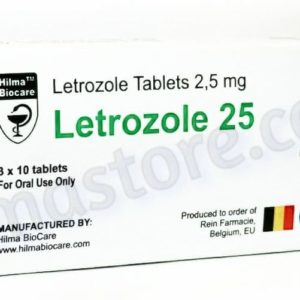Description
T4, Levothyroxine Sodium
Strength: 100 mcg
Molecular Formula: C15H11l4NO4,
Molecular Weight: 776,87 g/mol
Active Ingredient: Levothyroxine Sodium
CAS number: 51-48-9
Dosage Form: Tablet
Route: Oral
Market Status: Prescription
Company: Hilma Biocare
DESCRIPTION
Levothyroxine is a synthetic form of thyroxine (T4), an endogenous hormone secreted by the
thyroid gland, which is converted to its active metabolite, L-triiodothyronine (T3). T4 and T3
bind to thyroid receptor proteins in the cell nucleus and cause metabolic effects through the
control of DNA transcription and protein synthesis. Like it’s naturally secreted counterpart,
levothyroxine is a chiral compound in the L-form.
DIRECTIONS TO USE
Levothyroxine is a drug that is used to treat underactive thyroid (hypothyroidism) and other
conditions when a person’s thyroid hormone production is below normal. Levothyroxine
sodium replaces or provides thyroid hormone support, which is normally produced by the
thyroid gland. Low thyroid hormone levels can occur naturally or when the thyroid gland is
injured by radiation/medications or removed by surgery. Levothyroxine is also known as
L-thyroxine or T4. Thyroid medication is frequently used by bodybuilders getting ready for a
competition to lose excess fat by speeding up their basal metabolic rate and help them to
produce maximum muscle definition. Although the thyroid hormone T3 is more popular for
this purpose, T4 may lead to increased muscle retention and improve the effects of growth
hormone in weightlifters who are also taking growth hormone. Having excess thyroid
hormones in your body can help produce more short-term weight loss than by dieting alone,
but once the thyroid supplements are stopped, the excess weight loss is usually regained.
PHARMACOKINETICS
Absorption of orally administered levothyroxine from the gastrointestinal tract ranges from 40
to 80%, with the majority of the drug absorbed from the jejunum and upper ileum.
Levothyroxine absorption is increased by fasting and decreased in certain malabsorption
syndromes, by certain foods, and with age. Half-life elimination is 6-7 days for people with
normal lab results; 9-10 days for people with hypothyroidism 3; 3-4 days for people with
hyperthyroidism. Thyroid hormones are primarily eliminated by the kidneys (approximately
80%), with urinary excretion decreasing with age. The remaining 20% of T4 eliminated in the
stool.
CONTRAINDICATIONS
Levothyroxine is contraindicated in people with hypersensitivity to levothyroxine sodium or
any component of the formulation, people with acute myocardial infarction, and people with
thyrotoxicosis of any etiology. Levothyroxine is also contraindicated for people with
uncorrected adrenal insufficiency, as thyroid hormones may cause an acute adrenal crisis by
increasing the metabolic clearance of glucocorticoids.
SIDE EFFECTS
Allergies to the medicine are unlikely, but if the patient develops a severe reaction to this
drug such as difficulty breathing, shortness of breath or swelling of the face and tongue it is
imperative that the patient immediately seek medical attention. Adverse events are generally
caused by incorrect dosing. Side effects from excessive doses include weight loss, trouble
tolerating heat, sweating, anxiety, trouble sleeping, tremor, and fast heart rate. Use is not
recommended in people who have had a recent heart attack. Use during pregnancy has
been found to be safe. Acute overdose may cause fever, hypoglycemia, heart failure, coma
and unrecognized adrenal insufficiency. Acute massive overdose may be life- threatening;
treatment should be symptomatic and supportive. Massive overdose may be a required
beta- blockers for increased sympathomimetic activity. The side effects of overdosing appear
6 hours to 11 days after ingestion.
PRECAUTIONS
Prolonged use of high dosages in theory may lead to serious problems with thyroid and
suppression of endogenous hormone production. Studies show about 20% down after 3
weeks of usage. However, when used properly at recommended dosages, thyroid function
restores after 3-4 weeks Levothyroxine has adrenalin-like effects including increased heart
rate and nervousness, which could be avoided by using beta-blockaders.
DRUG INTERACTIONS
There are also foods and other substances that can interfere with absorption of thyroxine
replacement. Avoid taking calcium and iron supplements within 4 hours of the medication
and avoid taking soy products within 3 hours of the medication as these can reduce
absorption of the medication. Other substances that reduce absorption are aluminium and
magnesium containing antacids, simethicone or sucralfate, Cholestyramine, colestipol,
Kayexalate. Other substances cause other adverse effects that may be severe. Ketamine
may cause hypertension and tachycardia and Tricyclic and tetracyclic antidepressants
increase its toxícity. On the other hand Lithium causes hyperthyroidism by affecting iodine
metabolism of the thyroid itself and thus inhibits Synthetic levothyroxine as well.
SPECIAL WARNINGS
Levothyroxine Sodium should be introduced very gradually in patients aged over 50 years
and those with long standing hypothyroidism to avoid any sudden increase in metabolic
demands. Patients with panhypopituitarism or other causes predisposing to adrenal
insufficiency may react to levothyroxine treatment, and it is advisable to start corticosteroid
therapy before giving levothyroxine to such patients. Levothyroxine Sodium should be used
with caution in patients with cardiovascular disorders, including angina, coronary artery
disease, hypertension, and in the elderly who have a greater likelihood of occult cardiac
disease. Thyroid replacement therapy may cause an increase in dosage requirements of
insulin or other anti- diabetic therapy (such as metformin). Care is needed for patients with
diabetes mellitus, and diabetes insipidus. Subclinical hyperthyroidism may be associated
with bone loss. To minimise the risk of osteoporosis, dosage of levothyroxine sodium should
be titrated to the lowest possible effective level.
DOSAGE AND ADMINISTRATION
It is recommended that levothyroxine be taken with an empty stomach approximately half an
hour to an hour before meals to maximize its absorption, It is also recommended that the
patient take the tablet with one glass of water to ease swallowing as well as to help the tablet
dissolve for absorption. Dosages vary according to the age groups and the individual
condition of the patient, body weight and compliance to the medication and diet. Maximum
dosage may reach 300-400 mcg per day but that is rare. Most people need to be careful to
start with a low dosage. Don’t take more than 5-7 weeks at a time to keep the thyroid
functioning properly. After doing a course of treatment with this drug, make sure you go 4
weeks (better 8 weeks or more) before doing it again to allow normal thyroid functioning to
return.
PRESENTATION
Levothyroxine Sodium 100 mcg uncoated tablets, 50 tablets in 1 bottle.
STORAGE
Store in a cool dry place between 15 – 250C. Protect from light.




